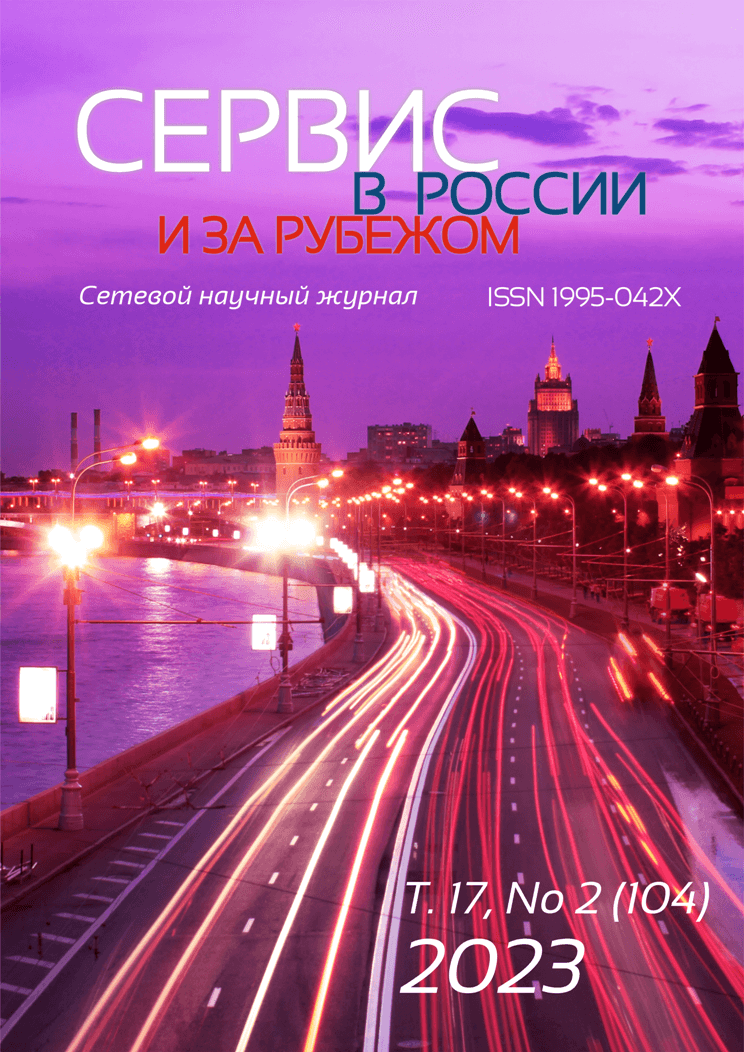Financial contagion of the economy tourism sector in different countries during the COVID-19 pandemic
DOI:
https://doi.org/10.5281/zenodo.8105607Keywords:
financial contagion, tourism, COVID-19 pandemic, testing, correlationAbstract
The purpose of the study is to identify the financial contagion that spread through the channels of the stock market in the economy tourist segment of different countries during the COVID-19 pandemic. The tourism industry has proved to be extremely susceptible to the pandemic shock, so it is necessary to have objective quantitative estimates of this susceptibility. The study is based on an extensive empirical base, including data on stock indices that reflect the stock quotes of the largest travel companies. The method of advanced correlation analysis was used as a specific method of detecting financial contagion, based on the Forbes-Rigobon approach. The classic Forbes-Rigobon test was supplemented with a sliding dynamic method, which made it possible to identify the intensity of country contagion in the tourism sector. The peculiarities of understanding the financial contagion essence in economic systems are revealed. A brief overview of modern research on the infection problems in tourism is made. A statistical analysis of COVID-19 impact on a number of countries has been carried out, the pandemic features and consequences for the tourism sector have been identified. For 5 countries (China, Taiwan, Great Britain, Greece and Turkey), test statistics for financial contagion are calculated. Dynamic estimates of the contagion were obtained, which allowed us to obtain a picture of the scale and intensity of financial contagion in international tourist markets during the pandemic. The recipients of financial infection from China were the tourist markets of Taiwan and Greece. At the same time, these countries turned out to be transmitters of financial contagion at the same time – with varying intensity, they transmitted it to other tourist markets.
Downloads
References
Aksenov, V. A., Kiryukhina, E. M., & Yakusheva, A. M. (2021). Koronavirus i turisticheskaya industriya Velikobritanii: opyt social'noj podderzhki otrasli [Coronavirus and the UK tourism industry: experience of social support of the industry]. Vestnik Nizhegorodskogo universiteta im. N.I. Lobachevskogo. Seriya: Social'nye nauki [Bulletin of the Nizhny Novgorod University named after N. I. Lobachevsky. Series: Social Sciences], 4(64), 88-96. doi: 10.52452/18115942_2021_4_88. (In Russ.).
Alieva, I. I. (2021). Ekonomika turisticheskoj otrasli Turcii v usloviyah COVID-19 [The economy of Turkey's tourism industry in the context of COVID-19]. COLLOQUIUM-JOURNAL, 7-1(94), 43-45. doi: 10.24412/2520-6990-2021-794-43-45. (In Russ.).
Bakerenko, Yu. (2019). V 2019 godu kitajskie turisty sovershili bolee shesti milliardov vnutrennih poezdok [In 2019, Chinese tourists made more than six billion domestic trips]. Belarus' segodnya [Belarus today]. URL: https://www.sb.by/articles/v-2019-godu-kitayskie-turisty-sovershili-bolee-6-milliardov-vnutrennikh-poezdok.html (Accessed on: 26.01.2023). (In Russ.).
Chen, S., Law, R., & Zhang, M. (2021). Review of research on tourism-related diseases. Asia Pacific Journal of Tourism Research, 26(1), 44-58. doi: 10.1080/10941665.2020.1805478.
Danilenko, D. (2020). Polgoda s koronavirusom: turbiznes za rubezhom podschityvaet poteri i delaet vyvody [Six months with coronavirus: the travel business abroad calculates losses and draws conclusions]. TOURDOM.RU. URL: https://www.tourdom.ru/news/polgoda-s-koronavirusom-turbiznes-za-rubezhom-podschityvaet-poteri-i-delaet-vyvody.html (Accessed on: 26.01.2023). (In Russ.).
Gössling, S., Scott, D., & Hall, C. M. (2021). Pandemics, tourism and global change: A rapid assessment of COVID-19. Journal of Sustainable Tourism, 29(1), 1-20. doi: 10.1080/09669582.2020.1758708.
Hou, Y., Zhang, K., & Li, G. (2021). Service robots or human staff: How social crowding shapes tourist preferences. Tourism Management, 83, 104242. doi: 10.1016/j.tourman.2020.104242.
Kang, Q., Zhou, L., Liu, J., & Ran, Y. (2022). Do contagion cues shape customers’ willingness to adopt hospitality service robots? International Journal of Hospitality Management, 104, 103244. doi: 10.1016/j.ijhm.2022.103244.
Onoiko, P. (2021). Za yanvar'-avgust 2021 goda Greciyu posetili bolee 8,6 milliona turistov [More than 8.6 million tourists visited Greece in January-August 2021]. Afinskie Novosti [Athens News]. URL: https://rua.gr/tur/news/44356-za-yanvar-avgust-2021-goda-gretsiyu-posetili-bolee-8-6-milliona-turistov.html (Accessed on: 26.01.2023). (In Russ.).
Plé, L., & Demangeot, C. (2020). Social contagion of online and offline deviant behaviors and its value outcomes: The case of tourism ecosystems. Journal of Business Research, 117, 886-896. doi: 10.1016/j.jbusres.2019.06.002.
Seth, N., & Panda, L. (2018). Financial contagion: Review of empirical literature. Qualitative Research in Financial Markets, 10(1), 15-70. doi: 10.1108/QRFM-06-2017-0056.
Sharma, G. D., Thomas, A., & Paul, J. (2021). Reviving tourism industry post-COVID-19: a resilence-based framework. Tourism Management Perspectives, 37, 100786. doi: 10.1016/j.tmp.2020.100786.
Tsai, M.-C. (2021). Developing a sustainability strategy for Taiwan’s tourism industry after the COVID-19 pandemic. PLoS ONE, 16(3), e0248319. doi: 10.1371/journal.pone.0248319.
Tyashin, Li, & Pankov, S. V. (2021). Analiz opyta vosstanovleniya turizma v Kitae: sostoyanie i prognozy [Analysis of the experience of tourism recovery in China: state and forecasts]. Geopolitika i ekogeodinamika regionov [Geopolitics and ecogeodynamics of regions], 7(17), 218-230. (In Russ.).
Zopiatis, A., Pericleous, K., & Theofanous, Y. (2021). COVID-19 and hospitality and tourism research: An integrative review. Journal of Hospitality and Tourism Management, 48, 275-279. doi: 10.1016/j.jhtm.2021.07.002.
Downloads
Published
How to Cite
Issue
Section
License
Copyright (c) 2023 Ovcharov, A. O., Kabirov, I. S., Gayazova, A. A., & Antipova, A. A.

This work is licensed under a Creative Commons Attribution-NonCommercial-ShareAlike 4.0 International License.












